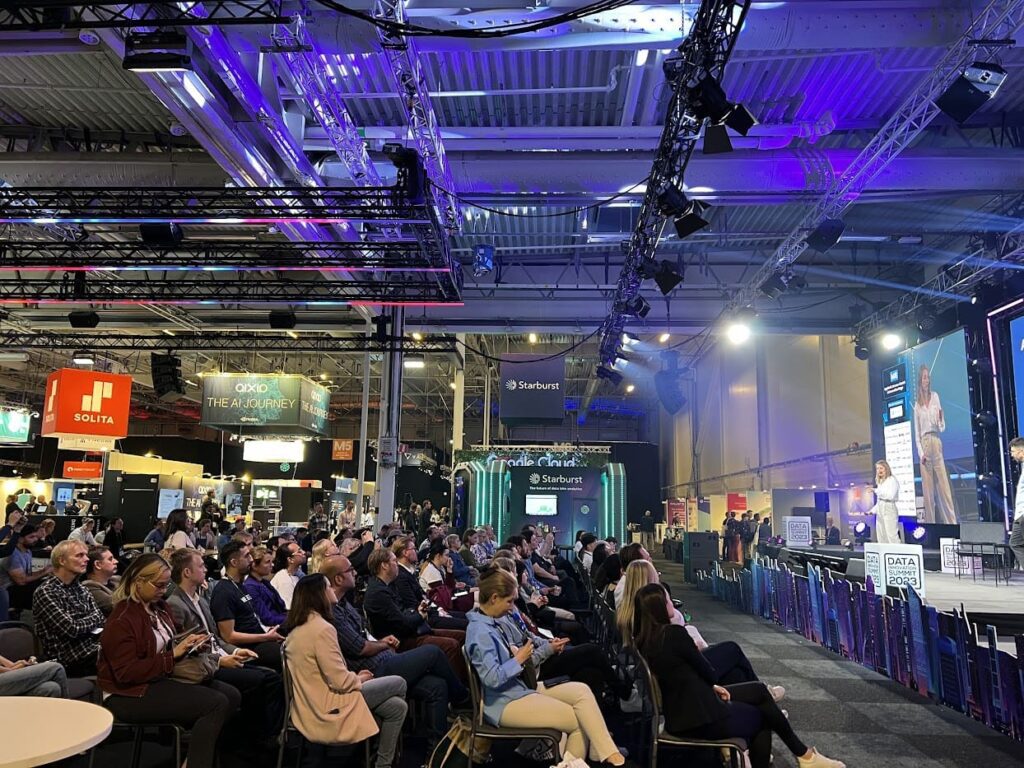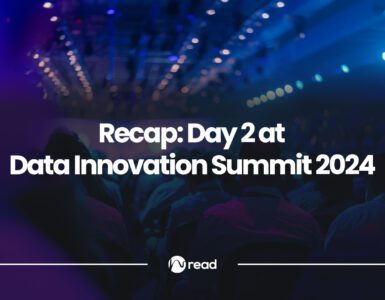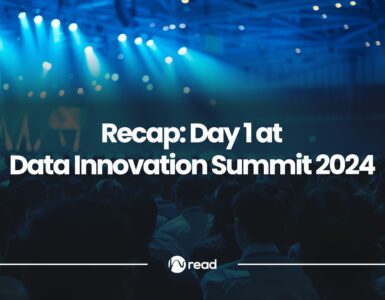Hyperight Read


DAIR Awards 2023 Summary: Recognizing Excellence and Celebrating Collaboration and Commitment to Data and AI: The 2023 Data, Analytics, and Artificial Intelligence event at the Nordic Data and AI Readiness (DAIR) Awards was a spectacular showcase of innovation. This article captures the essence of this year’s event, featuring insights into categories, nominees, and winners. The gala award ceremony, hosted at Vasateatern in Stockholm on December 5th, celebrated outstanding achievements in the realms of data and artificial intelligence. With 130 top practitioners in attendance, both physically and through a live online broadcast, the ceremony underscored its significance as a platform recognizing excellence. This ceremony is an annual tradition that highlights and honors achievements across multiple categories. Moreover, it stands as a testament to commitment in innovation, diversity, inclusion, knowledge-sharing, and motivation of future generations.
How to Master Data Science from First Principles: Delving into the Fundamentals of Data Science: In modern-day information technology, data science has become an essential force, transforming industries, guiding the intricacies of decision-making processes, and unraveling insights from vast amounts of data. As a cross-disciplinary domain, data science merges statistics, computer science, and domain expertise to derive meaningful insights from raw data. Yet, beneath algorithms and cutting-edge technologies lies a set of fundamental principles that lays the foundation for this discipline. Aditya Garg, Sr. Data Scientist at Tesla, delves into ”Data Science from First Principles”, a presentation at the Nordic Data Science and Machine Learning NDSML Summit 2023. He sheds light on the foundational principles of data science and the path to navigating its complexities. His presentation covers the foundational elements and building a framework for tackling data science problems.
5 Expert Tips on How to Move from Data Strategy to Distributed Value Creation: In the world of data-driven business where change is the only constant, organizations across diverse industries are realizing something big: harnessing the power of data is no longer just a choice; it’s a strategic imperative. Beyond the fundamentals of data collection and analysis, they are now adopting a more nuanced approach aimed at creating distributed value. What key factors contribute to the creation of value within an organization? How can we optimize it? How do we effectively align data strategies with regulatory compliance while fostering data democratization? These are just a few questions explored in the panel discussion “From Data Strategy to Distributed Value Creation” at the Data 2030 Summit 2023. Data professionals came together to unlock new horizons and innovations, therefore shaping the future landscape of data in the years to come.
News, Articles, and Reports


Artificial Intelligence Act: deal on comprehensive rules for trustworthy AI: On December 8th, Parliament and Council negotiators reached a provisional agreement on the Artificial Intelligence Act. This regulation aims to ensure that fundamental rights, democracy, the rule of law and environmental sustainability are protected from high-risk AI, while boosting innovation and making Europe a leader in the field. The rules establish obligations for AI based on its potential risks and level of impact.
Surpassing GPT-4 Capabilities with NexusRaven-V2: NexusRaven-V2 is a 13B LLM outperforming GPT-4 in zero-shot function calling, the capability to turn natural language instructions into executable code to use tools. The function calling capability lies at the core of the OpenAI Assistants API, and serves as the key to enabling copilots and agents to use software tools. To advance open-source models for copilots and agents, NexusRaven-V2 marks an exciting step in collaboration with the community to expand the open model ecosystem for technological and societal impacts. Highlights include state-of-the-art & generalizable capability; open-source and commercially permissive; ease of integration; and function calling benchmark and leaderboard.
Introducing Gemini: Google’s largest and most capable AI model: Step closer to this vision as we introduce you to Gemini, the most capable and general model ever built by Google DeepMind. Sundar Pichai, Google, and Alphabet CEO, states: ‘’Every technology shift is an opportunity to advance scientific discovery, accelerate human progress, and improve lives. I believe the transition we are seeing right now with AI will be the most profound in our lifetimes, far bigger than the shift to mobile or the web before it. AI has the potential to create opportunities — from the everyday to the extraordinary — for people everywhere. It will bring new waves of innovation and economic progress and drive knowledge, learning, creativity and productivity on a scale we haven’t seen before.’’ Nearly eight years into the journey as an AI-first company, the pace of progress is only accelerating: Millions of people are now using generative AI from finding answers to more complex questions to using new tools to collaborate and create.
Towards open trust and safety in the new world of generative AI – Announcing Purple Llama: Purple Llama, a Meta initiative, encompasses open trust and safety tools, providing developers with the means to responsibly deploy generative AI models. This initiative aligns with the best practices outlined in Meta’s Responsible Use Guide, aiming to create a fair and secure environment for AI development. As a first step, CyberSec Eval is released, a set of cybersecurity safety evaluation benchmarks for LLMs; and Llama Guard, a safety classifier for input/output filtering that is optimized for ease of deployment. Aligned with the open approach, Meta is looking forward to partnering with AI Alliance, AMD, AWS, Google Cloud, Hugging Face, IBM, Intel, Lightning AI, Microsoft, MLCommons, NVIDIA, Scale AI, and many others to improve and make those tools available to the open source community.
Anthropic’s latest tactic to stop racist AI: Asking it ‘really really really really’ nicely: The problem of alignment is important when you’re setting up AI models to make decisions in matters of finance and health. But how can you reduce biases if they’re baked into a model from biases in its training data? Anthropic suggests asking it nicely to please, please not discriminate or someone will sue us. Yes, really. In a self-published paper, Anthropic researchers led by Alex Tamkin looked into how a language model (in this case, the company’s own Claude 2.0) could be prevented from discriminating against protected categories like race and gender in situations like job and loan applications.
Portable, non-invasive, mind-reading AI turns thoughts into text: In a world-first, researchers from the GrapheneX-UTS Human-centric Artificial Intelligence Centre at the University of Technology Sydney (UTS) have developed a portable, non-invasive system that can decode silent thoughts and turn them into text. The technology could aid communication for people who are unable to speak due to illness or injury, including stroke or paralysis. It could also enable seamless communication between humans and machines, such as the operation of a bionic arm or robot. The study has been selected as the spotlight paper at the NeurIPS conference, showcasing world-leading research on artificial intelligence and machine learning, held in New Orleans on 12 December 2023.
Boosting Multi-Modal Fine-Tuning with In-Context Examples: Although In-Context Learning (ICL) brings remarkable performance gains to Large Language Models (LLMs), the improvements remain lower than fine-tuning on downstream tasks. This paper introduces Multi-Modal In-Context Tuning (MMICT), a novel multi-modal fine-tuning paradigm that boosts multi-modal fine-tuning by fully leveraging the promising ICL capability of multi-modal LLMs (MM-LLMs). Multi-Modal Hub (M-Hub) is proposed, a unified module that captures various multi-modal features according to different inputs and objectives. Based on M-Hub, MMICT enables MM-LLMs to learn from in-context visual-guided textual features and subsequently generate outputs conditioned on the textual-guided visual features. Extensive experiments on various downstream multi-modal tasks demonstrate that MMICT significantly outperforms traditional fine-tuning strategy and the vanilla ICT method that directly takes the concatenation of all information from different modalities as input.
Adjusting the format of papers to improve description by AI: The chatbot ChatGPT and other tools based on large language models (LLMs) can make scientific research more efficient, but they can also introduce mistakes when they describe scientific work (Nature 622, 234–236; 2023). This article suggests that small changes to the format of scientific papers could improve the training of LLMs.
AI Afterwork Podcast


AIAW Podcast Episode 109 – AI in Healthcare – Magnus Kjellberg: In Episode 108 of the AIAW Podcast, we feature Magnus Kjellberg, Head of AI Competence Center at Sahlgrenska University Hospital and Digitalisation Strategist at Västra Götalandsregionen, as our esteemed guest. Magnus, a veteran Data Scientist and Big Data Architect with over 15 years of experience, brings a rich perspective on AI and data science. This week, in Henrik Götberg’s absence, Louise Callenberg, Founder and Lead Trainer at Leadership ARTS, steps in as co-host alongside Anders Arpteg. Prepare for a captivating discussion on AI’s transformative power in various sectors!
AIAW Podcast Episode 110 – AI and Journalism – Olle Zachrison: In Episode 110 of the AIAW Podcast, we delve into the fascinating intersection of AI and journalism with our esteemed guest, Olle Zachrison, News Commissioner at Swedish Radio (SR). Olle leads SR’s innovative news strategy across various platforms and oversees news content from 33 dynamic newsrooms. As a Nordic AI Journalism Network co-founder, he’s at the forefront of integrating AI in journalism, promoting responsible and transparent practices. Join us for an insightful discussion on how AI is transforming the news industry, enhancing journalistic efforts, and shaping the future of media.
AIAW Podcast Episode 111 – How to build a LLM – Ariel Ekgren: In the 111th episode of the AI After Work Podcast, we welcome Ariel Ekgren, an esteemed Research Scientist specializing in deep learning and Natural Language Understanding. Ariel’s current focus is on developing Large Language Models tailored for Sweden and the Nordics, combining her expertise as a Research Scientist and Tech Lead at AI Sweden. In this insightful conversation, we delve into the cutting-edge of AI research and its regional impacts. Tune in for a deep dive into the world of AI innovation!
AIAW Podcast Episode 112 – NLP and Engineering – Kajsa Norin: This episode 112 of the AI After Word podcast, features Kajsa Norin, an accomplished NLP Consultant from Kajsa Norin AB. With eight years of experience in data science, Kajsa has a deep focus on Natural Language Processing and language technology, particularly in similarity search and generative AI models. As a machine learning consultant, she has been instrumental in helping clients leverage data to enhance their products and develop intelligent solutions. This episode dives into how these advanced technologies are reshaping language processing and data interaction. Whether you are a data science professional, enthusiast, or simply curious about AI and NLP’s latest trends, this episode offers insightful discussions and innovative perspectives.
Hyperight Attend


Data Innovation Summit: Kistamässan, Stockholm, 24 – 25th of April 2024
The 2024 edition of the Data Innovation Summit is scheduled for 24th & 25th April 2024, at Kistamässan Exhibition & Congress Centre in Stockholm, Sweden. This event brings together the most innovative minds, enterprise practitioners, technology providers, start-up innovators, and academics, working with Applied Data Innovation, Data Science, Big Data, ML, AI, GenAI, LLMs, Data Management, Data Engineering, Architecture, Databases, responsible AI, Industrial Analytics, in one place to discuss ways to accelerate AI-driven Transformation throughout companies, industries, and public organizations.
The 9th edition will cover a range of topics spread across 9 stages and 7 workshops aligned over a common theme ‘’From data to value in the age of applied and generative AI’’, signifying the shift from data and AI exploration to data- and ai-value creation with applied and generative ai. By registering, practitioners will engage with over 300 speakers, benefit from 200+ TIP sessions, and connect with professionals across the globe, accelerating AI-driven transformation in their organizations.
Here are some of the reasons to attend the Data Innovation Summit 2024:
- Unparalleled Scale: Join the largest annual data and AI gathering with over 3,000 attendees for an unforgettable experience.
- Comprehensive Learning: Explore 250 presentations, 7 workshop rooms, and more than 200 demos for a deeper understanding of the data-to-insight-to-action process.
- Dynamic Networking: Connect with more than 3,000 peers and 250+ global experts, fostering valuable relationships and collaborations.
- Showcasing Cutting-edge Technologies: Witness the latest technology from more than 100 exhibitors, some making their Nordic debut, offering a glimpse into the future of data and AI.
- Flexible Participation and Global Connection: Attend in person or online, tailoring your experience, and become part of a global movement connecting the data, analytics, and AI community.
- Immersive Engagement: Immerse yourself in vibrant activities, parties, and challenges for a balanced and enjoyable event.
Unlock the future of data innovation, and reserve your seat now at the event of the year. Don’t miss out, secure your spot at datainnovationsummit.com!
Until next time,
Hyperight Team














Add comment